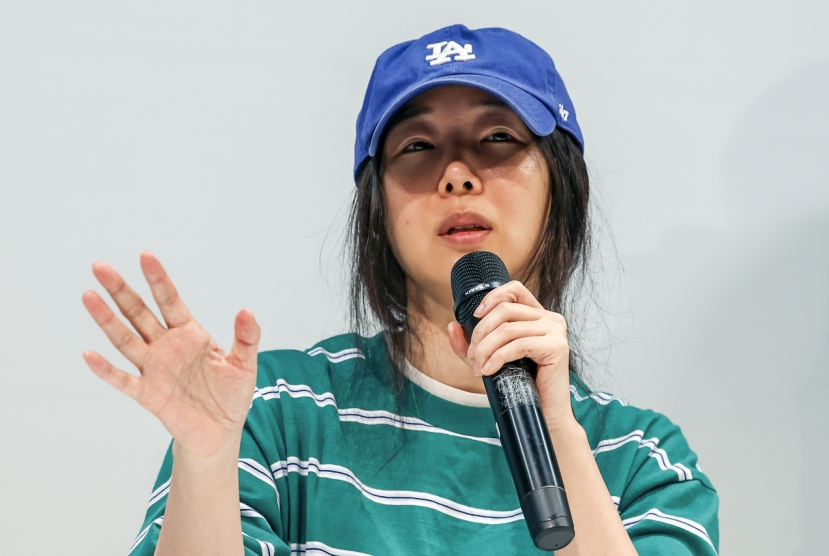Women`s colleges may not be as popular as they were in the past but they are still playing a significant role in nurturing women leaders in all walks of life.
Barnard College, a liberal arts college for women in New York City, is one of the few remaining same-sex schools in the northeastern United States.
Founded in 1889, Barnard is known for successful graduates, especially in the literary world, including seven Pulitzer Prize winners. The college is affiliated with Columbia University but maintains separate faculties, administration, trustees, operating budget and endowment.
Despite its widely known achievements in the United States, it is not as international as it should be, according to the school`s president.
"One of my missions is to internationalize Barnard as only about 3.8 percent of our students are non-American," said Debora L. Spar, president of Barnard College, in an interview with The Korea Herald yesterday in Seoul.
"Because Barnard is so small with only about 2,300 students, we treat visiting international students as transfer students; they get advisors, orientations and can take any class in Columbia as well."
Spar is set to meet with presidents of Korean universities during her two-day visit to discuss student exchange programs.
She was in Beijing last week to moderate a symposium honoring the legacy of Kang Tongbi, one of China`s earliest feminists and Barnard`s first Asian student a century ago. Kang, along with her political reformist father Kang Youwei, helped eliminate the traditional practice of foot-binding.
Four inspirational women leaders in China - a media mogul, an acclaimed author, an award-winning filmmaker and a renowned advocate for women`s rights - shared their stories of success and unique perspectives with young women at the symposium.
"I was most impressed by how active women have been across sectors in China. Women are more involved in the workforce than in the West, in part thanks to communism," Spar said.
"Whereas women became active in the West after developing theories on women`s rights, it is the reverse in China. They are now interested in theorizing and women`s studies."
Barnard is preparing to relaunch a women`s leadership program in September which will consist of liberal arts courses, internships and a capstone seminar where students will pull together what they have learned in their senior year and take part in skills training for public speaking, negotiations, finance and resilience.
"The curricular courses will be about what we can learn from history, literature or philosophy about women`s leadership and how women`s voices differ from men`s, for example," Spar said.
In the series of internship programs, each student intern will be assigned a mentor, a woman in a leadership position whom she can closely discuss with and give suggestions on the job.
Spar wrote a provocative column in the Washington Post in January suggesting that the financial turmoil could have been prevented had there been more women in high-level positions on Wall Street.
"Women deal with risk differently from men. Women are more cautious, whether the reason is biological or social," she said.
Despite the disastrous impact of the financial crisis on U.S. universities` endowment funds, Barnard seeks to raise scholarships for students with lower socioeconomic backgrounds.
"All the endowments are down by 25 to 30 percent. The wealthier schools have been hit worse than others because up to 50 percent of their operating budget comes from endowments. Some are now raising debts, issuing bonds and borrowing billions of dollars," Spar said.
"Barnard has a small endowment which covers only about seven percent of its operating budget. Because we can`t use federal funds to cover non-American students, we plan to raise scholarships in Asia to support more students from the region."
By Kim So-hyun
(sophie@heraldcorp.com)
- Hybe-Ador feud should have limited effect on Hybe's overall performance: analysts
- Legoland Korea Resort to open until 9 p.m.
- Posco Future M, Honda to launch battery materials venture in Canada
- NewJeans' singles, Japanese debut to proceed as planned, despite Hybe-Ador feud
- BTS’ RM to release second solo album in May
- Samsung mobile chief, Google device head meet in Seoul
- Second Gimpo civil servant found dead, after apologizing for not finishing work
- [Photo News] Hampyeong Butterfly Festival
- DP leader says he will meet Yoon without conditions
- More med professors considering weekly breaks amid prolonged doctors' walkout




![[Herald Interview] 'Amid aging population, Korea to invite more young professionals from overseas'](http://res.heraldm.com/phpwas/restmb_idxmake.php?idx=644&simg=/content/image/2024/04/24/20240424050844_0.jpg&u=20240424200058)











![[KH Explains] Korean shipbuilding stocks rally: Real growth or bubble?](http://res.heraldm.com/phpwas/restmb_idxmake.php?idx=652&simg=/content/image/2024/04/25/20240425050656_0.jpg&u=)

